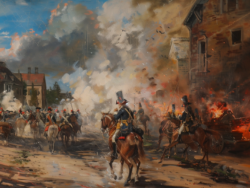
Author’s Note: This excerpt is from my weekly “Top of Mind” email, which goes out to subscribers every Thursday. This particular edition was sent on September 19, 2024. It is crossposted here in observance of Presidents Day, honoring George Washington’s pivotal role in securing American independence. For more content like this and to receive the […]
Read More
On February 9, 1775, the Parliament of Great Britain declared Massachusetts in a state of rebellion. With cause: Massachusetts’ Provincial Congress had met without royal leave and was organizing and training a military force. Massachusetts’ disobedience could no longer be ignored. Now, Britain would arm itself for war. Orders sailed to Governor Thomas Gage in […]
Read More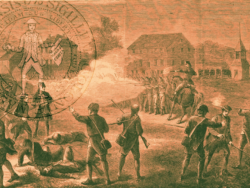
America survived those crucial months because we had self-government as well as liberty. The Second Massachusetts Provincial Congress assembled on February 1, 1775. The Second Congress would select Samuel Adams, John Adams, John Hancock, Thomas Cushing, and Robert Treat Paine to serve as delegates to the Continental Congress. It authorized a Committee of Safety—among other […]
Read More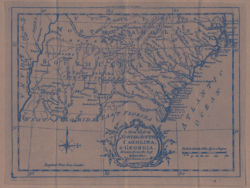
Francis Salvador, who emigrated from England to South Carolina in 1773, was the first Jew to be elected to a South Carolina legislative assembly—in 1774 and 1775, his neighbors voted him into South Carolina’s First and Second Provincial Congresses, with happy disregard for the statutes that gave Jews no right to vote or hold office. […]
Read More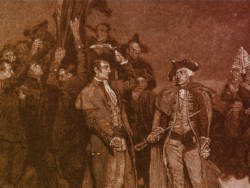
In New Hampshire, they call it “the shot not heard round the world.” On December 14, 1774, local patriots captured Fort McHenry in Portsmouth harbor. It’s probably—definitions and claims vary—the first open act of violent rebellion during the American Revolution. Patriots had been increasingly worried about control of scarce guns and powder since October when […]
Read More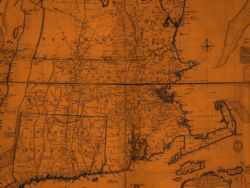
On December 10, 1774, the First Massachusetts Provincial Congress adjourned. They had been in session since October 7. They were America’s first revolutionary legislature, and they handled their business quite well. You can read all about it in their Journals. It’s an old nostrum that America was able to achieve independence so easily because they’d […]
Read More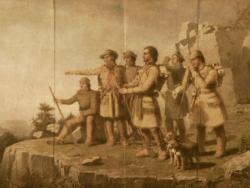
Thomas Paine arrived in America on November 30, 1774. He had to be carried ashore in Philadelphia half-dead from a shipboard fever. He left behind in England a life of poverty and failure, and he came to America with anger and resentment at the good and great who lived so well when he lived so […]
Read More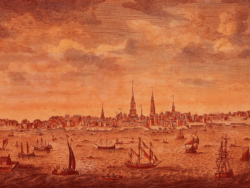
The trouble really begins when the fishermen and the fox hunters prepare to fight. The First Continental Congress had already met but hadn’t called for armed resistance. After all, they were still petitioning the king to withdraw the Intolerable Acts and were only calling for a boycott of British goods. But plenty of Americans had […]
Read More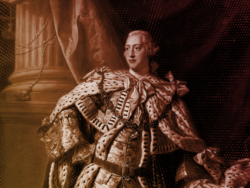
On what was likely a crisp autumn day in Philadelphia in 1774—before muskets and Minutemen—the American colonies chose diplomacy. They sent a carefully crafted petition to King George III, born out of frustration and hope, as a final effort to mend a relationship that had been fraying for years. Their grievances? Numerous. Following the French […]
Read More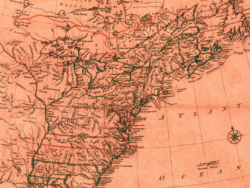
Sometimes, reform offers come too late. Joseph Galloway, speaker of the Pennsylvania Assembly, came to the First Continental Congress with a clever plan—the Plan of Union—to unite the British North American colonies in their own Parliament, subordinate to Great Britain’s Parliament. The American Parliament would vote on many matters, but Britain would have a veto. […]
Read More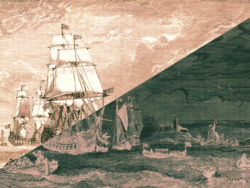
The First Continent Congress was not known for taking radical measures. When it met in Philadelphia in the autumn of 1774, it first rejected the plan but was forwarded by Pennsylvania representative Joseph Galloway, Speaker of the Pennsylvania Assembly. Galloway favored a “solid political union” between the colonies and Britain as the best way to […]
Read More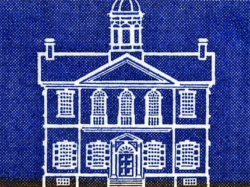
The Declaration and Resolves of the First Continental Congress was adopted on October 14, 1774. It’s important for all sorts of good reasons. The representatives of the colonies—except distant Georgia—came together for the first time to endorse a joint action. They invoked natural law to justify their rights as well as their rights as Englishmen—“the […]
Read More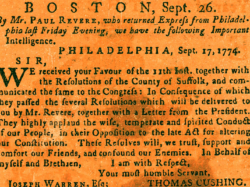
As a country, in celebrating resistance, we have lost sight of the important difference between resistance and resolution. For example, even before Donald J. Trump’s inauguration on January 20, 2017, plans were afoot to thwart his agenda. Those plans coalesced under the hashtag #Resistance, and included marches, demonstrations, plots for electors to ignore state election […]
Read More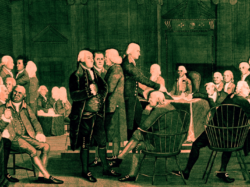
The First Continental Congress convened on September 5, 1774, in Carpenters’ Hall, Philadelphia. It brought together delegates from twelve of the thirteen North American British colonies to discuss what they might do collectively in response to the “Intolerable Acts” passed by the Crown in May and June. The Congress was not a revolutionary act. Indeed, […]
Read More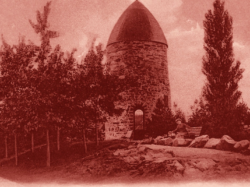
For months, the Massachusetts Governor’s allies plotted to strip citizens of their arms. Legislators said they sought only to enhance public safety. But they labored as far from the public eye as possible. Then revealing, “debating,” and passing their legislation in the space of one day, they hurried it to the Governor for signature. The […]
Read More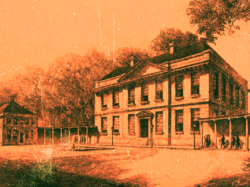
Between August 25 and August 27, 1774, the First North Carolina Provincial Congress met in New Bern, North Carolina. There they passed resolutions that they would not import any goods from Britain, including slaves, until the Intolerable Acts were rescinded. They also selected delegates for the First Continental Congress, which would meet the next month. […]
Read More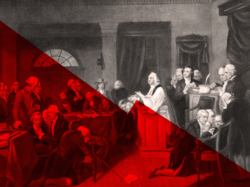
In the first days of August 1774, the Association of the Virginia Convention met and promulgated a series of resolutions that would guide its delegates to the First Continental Congress. These endorsed the policy of embargo with Britain—including slaves—until the Intolerable Acts were rescinded. The resolutions also endorsed in advance actions that would be taken […]
Read More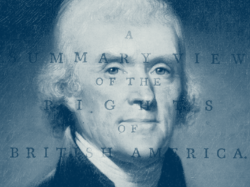
Thomas Jefferson wrote A Summary View of the Rights of British America in 1774, basically the first draft of the Declaration of Independence. That’s how he got to the drafting Committee of Five for the Declaration in 1776. Fine job you did in 1774, Thomas; why don’t you write another version now? Back in 1774, […]
Read More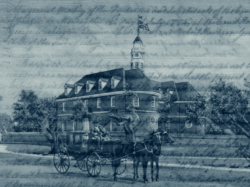
Virginians made the rejection of the Intolerable Acts revolutionary. The Intolerable Acts were outrageous abrogations of American liberty. Massachusetts was their primary target, but sympathy began to spread beyond its borders. The Orangetown Resolutions showed how small-town New Yorkers could commit themselves to solidarnosc with Boston. But the most important acceders were the Virginians. Virginia […]
Read More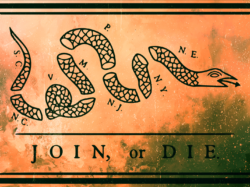
It was an immortal day dedicated to liberty. Stalwart patriots met on July 4, 1774. 1774? Yes. Two years before we declared our independence, the residents of Orangetown, New York subscribed to the Orangetown Resolutions. The Resolutions stated, in part: 1st, That we are and ever wish to be, true and loyal subjects to his […]
Read More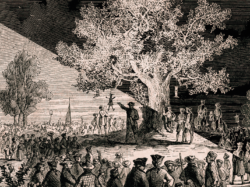
Parliament passed the Intolerable Acts, George III gave them his royal assent, and, at once, America rose in unanimous rebellion. No, of course not. American patriots were outraged. But in 1774, they weren’t yet at the point of armed rebellion. The radicals of Massachusetts, Samuel Adams and the Boston Committee of Correspondence, proposed instead a […]
Read More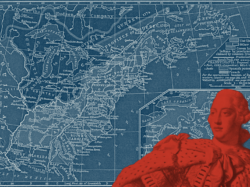
On June 22, 1774, the Quebec Act received royal assent. This, the climax of the Intolerable Acts, not only provided for greater accommodation of Catholicism and French law in Britain’s recently conquered colony of Quebec but also expanded its borders—to include virtually all of the trans-Appalachian West down to the Ohio River. It cut the possibility […]
Read More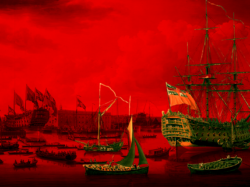
“That from henceforth we will suspend all commercial intercourse with the said island of Great Britain, until the said act for blocking up the said harbour be repealed.” — The Solemn League and Covenant, June 1774. Fueled by a fiery conviction to protest Parliament’s embargo on Boston’s port, a local committee crafted a persuasive letter […]
Read More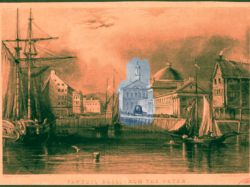
On June 15, 1774, Boston citizens held a meeting in Faneuil Hall to debate how the townsmen should respond to the blockade that the British had just imposed on the port of Boston. At issue was whether the citizens should pay for the tea that some radicals had dumped in the harbor back in December. […]
Read More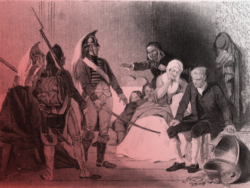
On June 2, 1774, the Quartering Act became law. A royal governor, if Britain’s North American colonies would not provide and pay for barracks, could now house British soldiers in any colonial “uninhabited houses, out-houses, barns, or other buildings” without consent of the legislature, township, or any American. The sun would not set on a […]
Read More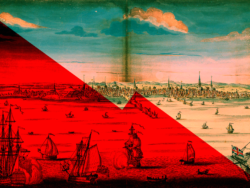
On June 1, 1774, Britain’s Parliament gave assent to the Boston Port Act. By mandating the complete shutdown of Boston’s port, prohibiting any loading, unloading, or transportation of goods within the town and its harbor, Parliament believed it was sending a powerful signal of its authority to the rebellious Bostonians who had dumped tea into […]
Read More
The Administration of Justice Act and the Massachusetts Government Act, two of the four Intolerable Acts, became law on May 20, 1774. The Administration of Justice Act allowed a royal governor to remove from one colony to another, or to England, the trial of a royal official for actions up to and including murder, committed […]
Read More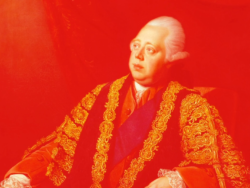
The nation’s 250 Anniversary is only 29 months away. The National Association of Scholars is commemorating the events that led up to the Second Continental Congress officially adopting the Declaration of Independence on July 4, 1776. This is the sixth installment of the series. Find the fifth installment here. “His Majesty trusts that no opposition […]
Read More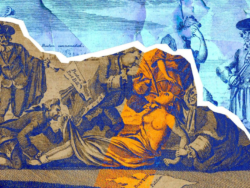
The nation’s 250 Anniversary is only 29 months away. The National Association of Scholars is commemorating the events that led up to the Second Continental Congress officially adopting the Declaration of Independence on July 4, 1776. This is the forth installment of the series. Find the fourth installment here. Intolerable is a strong word. We […]
Read More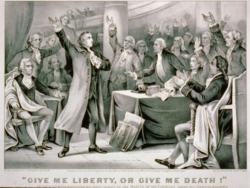
Editor’s Note: This article was originally published by Real Clear Wire on March 20, 2024 and is crossposted here with permission. On March 23rd in 1775, Patrick Henry rose at St. John’s Church in Richmond, Virginia, to urge his countrymen to arm themselves for the Revolutionary War. Four weeks before the battle of Lexington and Concord, Henry […]
Read More